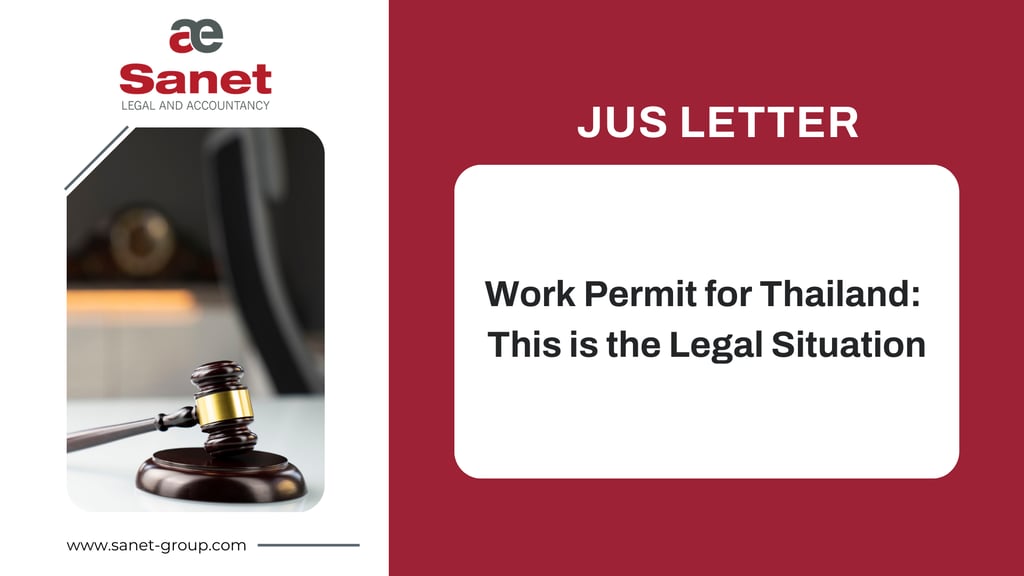Work Permit for Thailand: This is the Legal Situation
The Thai legislature requires a work permit for any activity that requires mental or physical exertion, regardless of whether it is paid or not. Misleading or simply false information on the internet about new visa types such as the ‘Work-From-Thailand-Visa’, or “remote work” for foreign employers has led to confusion regarding the unchanged need for a work permit for Thailand.
LEGAL


SHORT TERM ACTIVITIES AND BUSINESS MEETINGS
In general, a work permit is required for Thailand, regardless of whether the work is paid or not. The determining factor is whether you are performing a task that requires mental or physical exertion. This also applies to short-term tasks.
As this definition can sometimes miss the mark, Thai lawmakers introduced an exception in 2018. It applies to organizing or participating in a meeting or conference. This also includes giving a lecture or presentation as part of a meeting, workshop, training course or seminar. This eases the exploration of the market, the initiation of business and the supervision of the Thai subsidiary for foreign investors.
The pursuit of artistic and cultural activities or participation in sporting competitions also do not require a work permit. In the case of urgently required work, such as the installation or repair of machinery, foreign skilled workers can apply for an “Urgent Work Permit”. Within one working day, the applicant can receive a work permit for 15 days, which can be extended (at most) once by 15 days. After completing the work, the applicant must leave the country immediately.
REMOTE WORK IN THAILAND
Legally, there is no difference between “working in Thailand” and “working from Thailand” with regard to work permits. “Digital nomads” and “remote workers” who work for foreign companies and wish to work from Thailand therefore also require a work permit.
“Influencers” and “travel bloggers” also belong to this group. Although the authorities do not give top priority to prosecuting them, they will always take action if a complaint or report is made. This unauthorized activity then risks the immediate deportation of “unwelcome guests”.
Just recently, at the end of 2023, a Chinese influencer posted a negative video about Bangkok’s nightlife and was expelled from the country for not having a work permit. Getting rid of a friend or acquaintance who has become disagreeable through such a complaint can quickly become an easily enforceable method, even in a private dispute.
For vacationers who only use their company PC for a few days during their stay in Thailand, it is unlikely that any problems will arise in practice. The exact period of time after which a work permit is required is not clearly regulated, but from public statements by the Labor Department it can be concluded that this could nevertheless be the case after just a few weeks of “working on vacation”. In any case, vacation is not suitable as an argument for abuse, especially since the simple residence permit in the passport is limited to 30 days.
Connect
© Sanet Group (2025). All rights reserved.
2/1 Soi Rom Klao 25/2
Bangkok 10520, Thailand
+66 2 737 642-0
management@sanet.co.th
www.sanet-group.com
Business License
No. 0105548029419
Recruitment License
No. 1900/2567
2/1 Soi Rom Klao 25/2
Bangkok 10520, Thailand
+66 2 737 642-0
partner@sanet-legal.com
www.sanet-group.com
Business License
No. 0105560114781
2 Soi Rom Klao 25/2
Bangkok 10520, Thailand
+66 2 737 642-0
management@sanet.co.th
www.sanet-group.com
Business License
No. 0105543069391
2/1 Soi Rom Klao 25/2
Bangkok 10520, Thailand
+66 2 737 642-0
management@sanet.co.th
www.sanet-group.com
Business License
No. 0105567088611
Denk IT GmbH
An Der Aspe 7
36137 Großenlüder
Hessen, Germany
www.denkit.com
+49 661 250090-20

